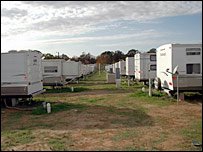New Orleans has 180,000 homes and needs more
 Dateline New Orleans - At the moment, a major constraining factor on businesses' return and local job growth is housing. The 180,000 habitable homes in New Orleans just about equal the city's current population.
Dateline New Orleans - At the moment, a major constraining factor on businesses' return and local job growth is housing. The 180,000 habitable homes in New Orleans just about equal the city's current population."It's a capacity constraint," says Greg Rigamer, president of consultant GCR & Associates in New Orleans.
To encourage new growth, city officials are traveling the country, alerting companies to the new Gulf Opportunity Zone Act, which Congress passed to give businesses investment incentives.
The Gulf Opportunity Zone Act of 2005 is a far-reaching measure that impacts many businesses, investors and individuals nationwide as well as in the hurricane-affected areas, due to the broad scope of some hurricane-related provisions and because of the numerous technical corrections that have been made to earlier tax laws.
Congress included technical corrections affect 10 past tax acts going back to 1987, including a number of important amendments related to the American Jobs Creation Act of 2004. The changes include clarifications to the Sec. 199 domestic production deduction, Sec. 409A nonqualified deferred compensation rules, and Sec. 965 repatriated dividends deduction.
Although the GO Zone provisions apply only to the specific geographical area devastated by Hurricane Katrina (and in some limited circumstances to those affected by Hurricanes Rita or Wilma), affected taxpayers outside those boundaries will qualify for relief if they have investments or own an interest in property or businesses within the zone, or invest in the GO Zone within the timeframe for the targeted tax relief.
Companies investing in the hurricane-impacted areas, for example, are eligible to depreciate their investment by 50 percent in the first year, or are eligible for long-term financing through tax-exempt bonds.
We are meeting on 1 February 2006 at 0900 downtown to talk about how Cincinnati Change can help rebuild the Gulf with Ohio businesses. It will bring over 200 jobs to the city of Cincinnati.
